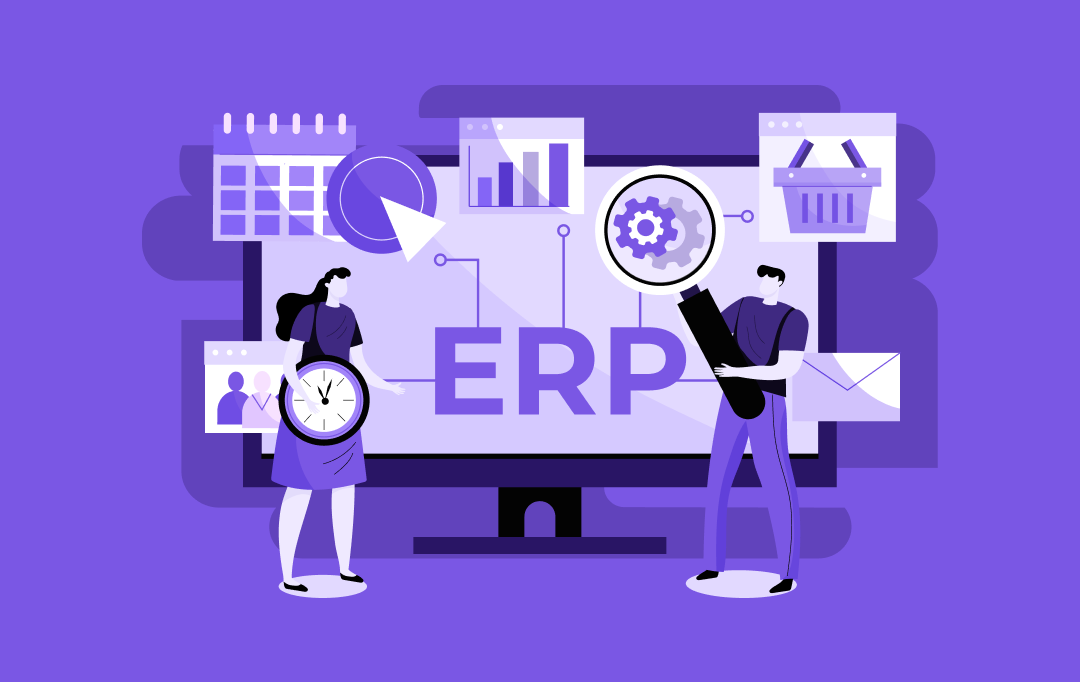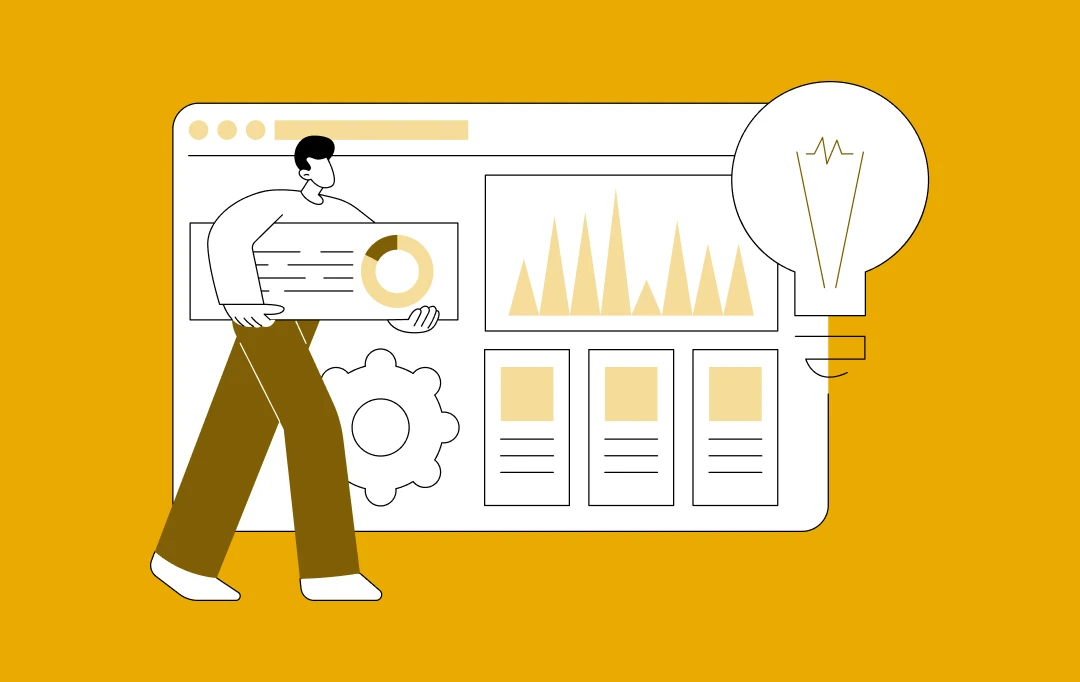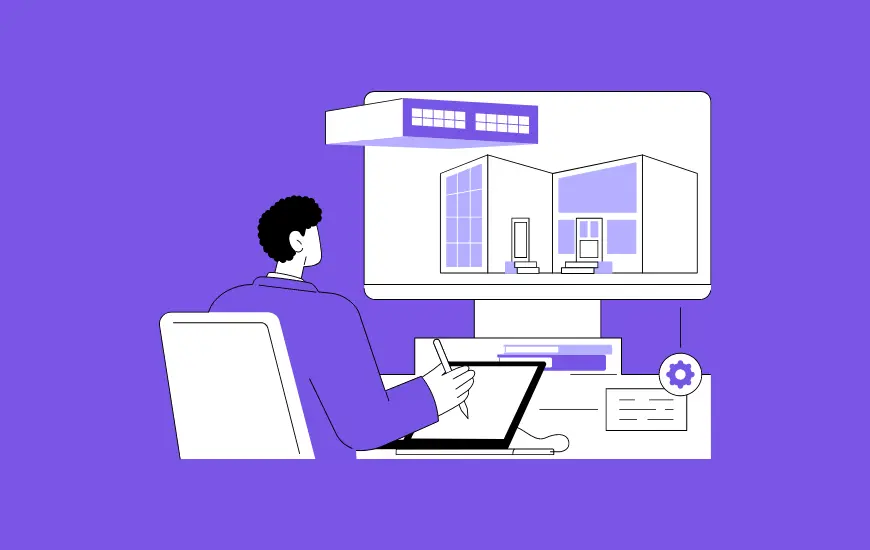- How Much Does It Cost to Develop a Hotel Management Software? Details
- Factor Influencing the Hotel Management Software Development Cost
- Modules Included
- Type of Hotel Management System Being Developed
- Complexity of Features
- Design Requirements
- Development Team and Location
- Third-Party Integrations
- Compliance and Security Standards
- Tech Stack
- Quality Assurance
- Maintenance
- Hotel Management Software Modules You Can Consider Adding
- Reservations Management
- Guest Handling
- Sales
- Customer Relationship Management (CRM)
- Back Office
- Front Desk
- Housekeeping
- Channel Management
- Reservations Management
- Guest Handling
- Sales
- Customer Relationship Management (CRM)
- Back Office
- Front Desk
- Housekeeping
- Channel Management
- Admin- and User-Side Features to Add in a Hotel Management Software
- Admin Side Panel Features
- User Side Panel Features
- Hotel Management Software Development Process
- Define Goals
- Build a Team
- Design
- Develop
- Secure Data and Communication
- Ensure Compliance with Regulations
- Test and Refine
- Deploy
- Maintain
- Overcoming Challenges in Hotel Management Software Development
- Elevate Your Hotel Management Software Development Initiatives with Appinventiv’s Expertise
- FAQs
The hotel management industry faces numerous challenges in today’s fast-paced and competitive market. From ensuring top-notch guest experiences to managing operational efficiencies, hotels must navigate a complex landscape of demands and expectations.
Key issues include maintaining high occupancy rates, managing reservations and cancellations, optimizing pricing strategies, and ensuring seamless communication across departments. Moreover, the need to adapt to technological advancements and changing customer preferences adds to the complexity.
Hotel management software development services have emerged as a strategic solution to these challenges. By integrating various operational aspects into a single platform, HMS enables hoteliers to streamline processes, enhance guest satisfaction, and improve overall efficiency.
These software solutions offer real-time booking management, automated pricing adjustments, comprehensive guest profiling, and robust reporting tools. Through the strategic deployment of HMS, the hotel management industry is better equipped to tackle its biggest challenges and deliver exceptional service in an increasingly dynamic environment.
The Hotel Property Management Software Market size was estimated at $7.91 billion in 2024 and is projected to grow at a CAGR of 10.84%, reaching $14.71 billion by 2030.

Developing hotel management software requires a strategic approach, involving comprehensive market analysis, detailed planning, and substantial technological investment. Generally the Hotel management software development cost ranges from $40,000 to $300,000, depending on factors like the complexity of UI/UX design, the location of the development team, and the range of features included.
This blog aims to guide you through the crucial factors influencing the development costs of hotel management software, along with other vital aspects essential for a successful launch. Let’s delve into the details!
How Much Does It Cost to Develop a Hotel Management Software? Details
Custom hotel management software development involves numerous factors influencing the overall cost, including feature complexity, technological innovation, UI/UX design, and team location. The intricacy of features such as reservation systems, room management, billing and invoicing, customer relationship management (CRM), and integration with other hotel systems significantly impact development costs.
Considering these factors, the estimated hotel management software development cost typically ranges from $40,000 to $300,000. However, costs may vary depending on specific project requirements and chosen development approaches.
| Type of Software | Cost Estimation | Time Duration | Features |
|---|---|---|---|
| Basic | $40,000 to $60,000 | 2-4 months | Essential functionalities such as room booking, guest check-in/check-out, basic billing, and simple reporting |
| Intermediate | $60,000 to $90,000 | 4-8 months | Enhanced features including advanced reservation systems, inventory management, comprehensive billing, CRM, and detailed reporting tools |
| Advanced | $90,000 to $300,000+ | 9+ months | Full-scale solutions with sophisticated functionalities such as real-time booking systems, dynamic pricing, integration with third-party services, advanced CRM, data analytics, and mobile app integration for guests and staff |
Let’s explore the various factors contributing to the cost of custom hotel management software development!
Factor Influencing the Hotel Management Software Development Cost
Several factors influence the highly varying hospitality software development costs, each playing a crucial role in determining the overall expenses. To understand their impact on development costs, let’s explore these factors in detail.

Modules Included
The number and type of modules in hotel management software greatly impact development expenses. While advanced modules like CRM, housekeeping, and inventory control add complexity and cost, basic modules handle reservations and billing. Each module requires specific functionalities and testing, with customization further increasing hotel management software development costs but ensuring the software meets the hotel’s unique needs.
Type of Hotel Management System Being Developed
The type of hotel management system being developed also influences costs. A basic property management system (PMS) suitable for small hotels typically includes basic features and functionalities. However, advanced solutions like comprehensive multi-property management systems, boutique hotel management systems, and resort management systems that manage multiple properties require more extensive features, higher scalability, and robust security measures, all contributing to higher hotel management software development costs.
Complexity of Features
The complexity of features required in the software, from basic functionalities like room booking to advanced capabilities such as real-time analytics, significantly influences custom hotel management software development cost.
Design Requirements
The level of sophistication and user experience design required for the software interface can impact costs. High-quality UI/UX design ensures smooth navigation and enhances user satisfaction but may incur additional hotel management software development costs.
Development Team and Location
The size and expertise of the development team, as well as their geographical location, affect costs. Rates vary across regions, and hiring skilled hotel management software developers may come at a premium.
| Region | Hourly Rates of Development |
|---|---|
| UAE | $60-$65 |
| US | $95-$100 |
| Western Europe | $80-$90 |
| Australia | $70-$90 |
| Eastern Europe | $50-$55 |
| Asia | $25-$40 |
Third-Party Integrations
Integrating the custom software with external services and platforms such as property management systems, channel managers, or payment gateways adds complexity to the development process and may require additional resources, impacting costs.
Compliance and Security Standards
Adhering to industry regulations and implementing robust security measures to protect sensitive guest data is essential. Compliance requirements and security features may increase development costs.
Tech Stack
The selection of programming languages, frameworks, and technologies used in development impacts costs. Utilizing cutting-edge technologies or specialized tools may require higher investment.

Quality Assurance
Testing and quality assurance processes ensure software reliability and performance. Investing in thorough QA procedures may increase initial development costs but reduces the risk of post-launch issues.
Maintenance
Ongoing maintenance and support are necessary to ensure software functionality and address issues as they arise. Budgeting for regular updates, bug fixes, and technical support is essential for long-term sustainability.
Considering these factors comprehensively during the planning phase enables accurate cost estimation and ensures the development of a high-quality hotel management software solution tailored to specific business needs.
Hotel Management Software Modules You Can Consider Adding
The hotel management software system can incorporate various modules that streamline processes and improve guest satisfaction and experience. However, incorporating these modules can impact the overall hotel management software development costs. Let’s check out some important modules you can consider adding.

Reservations Management
- Room Availability Check
- Online Booking
- Reservation Modifications
Guest Handling
- Guest Profiles
- Check-In/Check-Out
- Guest Feedback
Sales
- Rate Management
- Sales Reporting
- Promotional Offers
Customer Relationship Management (CRM)
- Loyalty Programs
- Personalized Offers
- Guest Communication
Back Office
- Accounting
- Inventory Management
- HR Management
Front Desk
- Check-In/Check-Out
- Room Allotment
- Billing
Housekeeping
- Task Scheduling
- Inventory Usage
- Room Status Updates
Channel Management
- Channel Integration
- Rate Parity
- Availability Sync
Reservations Management
The reservations management module manages the entire booking process, including checking for available rooms, making bookings, canceling, and making revisions. It integrates with the hotel’s website and other booking websites for real-time changes. By guaranteeing seamless reservations, this module helps expedite the booking process, lower the risk of overbooking, and enhance the overall visitor experience.
Guest Handling
The guest management module manages guest profiles, including personal information, preferences, and stay history. It makes the check-in and check-out procedures easier, giving visitors a flawless experience. Additionally, this module can keep track of specific requests and participation in reward programs, improving client satisfaction and tailored service.
Sales
The sales module manages all sales activities using the hotel management system software. It includes setting and adjusting room rates, handling reservations, managing group bookings, and tracking inventory. This module also processes inquiries, schedules work orders, and sends emails and alerts. It generates reports to help admins monitor sales performance and make informed decisions.
Customer Relationship Management (CRM)
The CRM module tracks guest feedback, preferences, and communication history. By utilizing robust CRM software, hotel staff or administrators can manage guest interactions, loyalty programs, and marketing campaigns. By analyzing guest data, this module enables hotel staff to coordinate with their guests, improve their overall stay, and offer continued quality-based services.
Back Office
The back office module handles all administrative and other operational backend tasks. This includes invoice management for businesses and travel agencies, deposits, and guest ledgers. This module ensures efficient financial management and record keeping.
Front Desk
The front desk module guarantees effective check-in, check-out, and other guest services, overseeing all front desk operations. It handles room allotments, guest notifications, night audits, and more, overall offering guests a seamless experience.
Housekeeping
The housekeeping management module monitors and schedules various housekeeping tasks, ensuring that the rooms are well-maintained and cleaned. It tracks housekeeping services or maintenance requests, room cleaning status, and availability of cleaning supplies. This module enhances operational efficiency and improves hotel room turnover rates, ensuring a pleasant guest experience.
Channel Management
The channel management module connects with various booking platforms and online travel agencies to manage room availability and rates. This module ensures real-time updates across several channels, thus optimizing room occupancy and reducing the risk of overbooking. This module overall helps in expanding the hotel’s reach, and maximizing its revenue.
Admin- and User-Side Features to Add in a Hotel Management Software
In designing a hotel management software solution, it’s imperative to integrate features tailored to meet the diverse needs of hotel staff and guests alike. Let’s explore these pivotal features that contribute to the efficacy and success of hotel management software.
Admin Side Panel Features

Reservation Management: This feature allows administrators to view, modify, and manage reservations, including room assignments, booking status, and guest details.
Inventory Management: Admins can monitor and manage hotel inventory, including rooms, amenities, and other resources, ensuring optimal utilization and availability.
Billing and Invoicing: This feature enables administrators to generate invoices, track payments, and manage billing processes for guests, groups, and corporate clients.
Staff Management: Admins can manage staff schedules, assignments, and performance, as well as track attendance and payroll information.
Maintenance Management: Admins can schedule and track maintenance tasks for rooms, facilities, and equipment, ensuring a smooth and seamless guest experience.
Security and Access Control: Security and access is one of the prominent hotel management software features. This feature allows administrators to control access to sensitive information and system functionalities, ensuring data security and compliance with regulations.
Analytics and Reporting: This feature provides insights into key performance, such as occupancy rates, revenue, and guest satisfaction, helping administrators make data-driven decisions to optimize operations.
Also Read: AI Analytics for Businesses – Benefits, Use Cases, and Real Examples
User Side Panel Features

Reservation Booking: Users can easily search for available rooms, make reservations, and manage their bookings, including viewing details, modifying dates, and canceling reservations if necessary.
Check-In/Check-Out: This feature allows users to check in and check out seamlessly, either through self-service kiosks or assisted by hotel staff, minimizing waiting times and enhancing convenience.
Billing and Payments: This feature streamlines the entire billing process, allowing users to manage their bills effectively. It also supports various payment methods, ensuring accurate invoicing and convenience for users to make hassle-free payments.
Room Service and Amenities: Users can request room service, amenities, and additional services directly through the user panel, providing a convenient and hassle-free experience.
Feedback and Reviews: Users can provide feedback and reviews about their stay, allowing hotel management to monitor guest satisfaction and address any issues promptly.
Account Management: This feature enables users to manage their personal information, preferences, and loyalty program memberships, ensuring a personalized and tailored experience.
Concierge Services: Users can access concierge services, such as local recommendations, transportation assistance, and activity bookings, enhancing their overall stay experience.
Notifications and Alerts: Users receive real-time notifications and alerts about their reservations, promotions, and other relevant information, keeping them informed throughout their stay.
These panel-wise features overall enhance the functionality of your software solution; however, they impact the total hotel management software development costs.
Hotel Management Software Development Process
In order to build a hotel management software, it is essential to have a meticulous approach, extensive research, and attention to detail that meets the diverse needs of hoteliers and guests. Let’s explore the custom hotel management software development process in depth:

Define Goals
Determine the specific challenges faced by your hotel management staff, such as efficient reservation handling, guest satisfaction management, inventory tracking, and reporting. Once done, you will be able to establish the key goals for your hotel management software and determine the overall scope of the project.
Build a Team
Assemble a team with expertise in hospitality software development, UX/UI design, and database management. Developing hotel management software requires a deep understanding of hotel operations and guest expectations, so domain experts in the hospitality industry are invaluable.
Design
Design an intuitive and user-friendly interface that streamlines hotel operations for staff and enhances the guest experience. Pay attention to features like easy reservation management, clear room status indicators, and quick access to guest information.
Develop
Develop robust backend systems to efficiently manage hotel operations, including reservation management, room assignments, housekeeping schedules, and billing. Integrate with third-party systems such as payment gateways, property management systems (PMS), and customer relationship management (CRM) tools.
Secure Data and Communication
Implement security measures to protect sensitive guest data, including encryption of personal information, secure payment processing, and access controls for staff members. Ensure communication channels between the software components are encrypted to prevent data breaches.
Ensure Compliance with Regulations
For hospitality software development, ensure compliance with industry standards and regulations specific to the hospitality sector, such as data protection laws (GDPR), payment card industry standards (PCI-DSS), and regulations governing guest data privacy. Compliance with local hotel licensing and tax regulations is also crucial.
Test and Refine
Conduct extensive testing of the software to ensure smooth operation under various scenarios, including peak booking periods and unexpected system loads. Test the software from both staff and guest perspectives to identify any usability issues or bugs that need to be addressed.
Deploy
Deploy the hotel management software across all relevant devices and platforms used by hotel staff, including desktop computers, mobile devices, and tablets. Provide training and support to hotel staff to ensure a smooth transition to the new software system.
Maintain
Continuously monitor and update the hotel management software to address any bugs, security vulnerabilities, or performance issues that may arise. Gather feedback from hotel staff and guests to identify areas for improvement and implement updates accordingly. Regularly update the software to stay current with evolving industry trends and technology advancements. Maintenance also incurs a certain hotel management software development cost, which you can understand in this blog.
Also Read: What is the Cost of Maintaining an App in 2024?
Overcoming Challenges in Hotel Management Software Development
Developing hotel management software comes with a myriad of intricate challenges, each demanding meticulous attention and innovative solutions. These challenges encompass a broad spectrum, ranging from technical complexities to user-centric considerations, and include:
Challenge 1: Integration Complexity
Integrating various systems within a hotel management software suite, including reservation systems, housekeeping management, point of sale (POS) systems, and customer relationship management (CRM) tools, can be highly complex. Each system may have its own data format, protocols, and APIs, making seamless integration challenging.
Solution: Unified API
Developing a unified API that acts as an intermediary layer between different modules can simplify integration efforts. This API can standardize data formats and communication protocols, allowing seamless interaction between various components of the hotel management software.
Challenge 2: Scalability
Hotel management software must be able to handle varying scales of operations, from small boutique hotels to large chains with hundreds of properties. Ensuring that the software remains performant and responsive under heavy loads while scaling up is a significant challenge.
Also Read: Application Scalability – Future-Proofing Your App for Long-Term Success
Solution: Cloud Infrastructure
Utilizing cloud infrastructure allows for flexible scaling of resources based on demand. By leveraging services such as auto-scaling and load balancing, the software can efficiently handle fluctuations in usage without compromising performance.
Challenge 3: Security
Hotel management software deals with sensitive customer data, including personal information, payment details, and booking records. Ensuring the security and privacy of this data against cyber threats such as data breaches, hacking attempts, and malware attacks is crucial.
Solution: Encryption and Access Control
Implementing robust encryption mechanisms to protect data both in transit and at rest can mitigate the risk of unauthorized access. Additionally, implementing strict access control measures, such as role-based access control (RBAC) and multi-factor authentication (MFA), can further enhance security.
Challenge 4: Mobile Accessibility
In today’s digital age, guests expect seamless access to hotel services and information through mobile devices. Developing a mobile-friendly interface that offers functionalities such as mobile check-in/check-out, room service requests, and concierge services poses a unique challenge.
Solution: Responsive Design and Native Apps
Adopting a responsive design approach ensures that the hotel management software interface adapts seamlessly to various screen sizes and devices. Developing native mobile apps for popular platforms like iOS and Android can further enhance the user experience by leveraging device-specific features and capabilities.
Challenge 5: Real-Time Data Analysis
Hotel managers require real-time insights into various aspects of operations, including occupancy rates, revenue trends, and guest preferences, to make informed decisions. Processing and analyzing large volumes of data in real-time present technical challenges.
Solution: Big Data Analytics
Implementing big data analytics techniques, such as stream processing and predictive analytics, can enable real-time data analysis. By leveraging technologies like Apache Kafka and Apache Spark, hotel management software can generate actionable insights promptly, empowering managers to optimize operations effectively.
Challenge 6: Regulatory Compliance
Hotel management software must comply with various regulations and standards, such as GDPR (General Data Protection Regulation) and PCI DSS (Payment Card Industry Data Security Standard), to ensure the lawful and secure handling of customer data.
Solution: Compliance Framework
Developing a comprehensive compliance framework that encompasses relevant regulations and standards ensures that the software adheres to legal and industry requirements. Regular audits and assessments can verify compliance and identify areas for improvement to maintain regulatory adherence.
Elevate Your Hotel Management Software Development Initiatives with Appinventiv’s Expertise
Empower your hotel business with Appinventiv, a premier hospitality software development services company dedicated to crafting cutting-edge solutions tailored to your unique needs. At Appinventiv, we collaborate with hotels and hospitality businesses to create innovative and impactful hotel management software. Our team works closely with you to understand your objectives and challenges, ensuring our solutions address your requirements.
From comprehensive ideation to strategic UI/UX design and seamless frontend and backend development, we offer a full spectrum of hotel management software development services. With rigorous quality assurance testing, deployment support, and ongoing maintenance, we ensure that your hotel management software operates seamlessly, providing unparalleled efficiency and guest satisfaction.
At the forefront of Empire App’s development journey, Appinventiv played a pivotal role in assisting to build a cutting-edge solution that revolutionized the hotel booking industry. Through strategic consulting, Appinventiv gained a deep understanding of Empire App’s vision and market challenges, paving the way for informed decision-making throughout the development process.
Leveraging expertise in blockchain technology and cryptocurrency integration, Appinventiv provided tailored solutions, including a blockchain-powered web panel for hotel staff, Empire Cash creation functionality, a crypto wallet, and a user-friendly mobile app.

Join us today to revolutionize hotel management with cutting-edge software development services. Connect with our experts to get the entire hotel management software development cost estimation. Together, let’s enhance operational efficiency, elevate guest experiences, and spark innovation in the hospitality industry.
FAQs
Q. What are the advantages of building a hotel management system?
A. Building a hotel management system offers a host of advantages, including:
- Streamlined operations
- Enhanced guest experience
- Optimized revenue management
- Data-driven decisions
- Reduced costs
- Increased revenue potential
- Enhanced security
- Competitive advantage
Q. How to build a hotel management system?
A. Here are the key steps of building a hotel management system:
Define goals: Identify the specific goals and needs of your hotel management project and the challenges that your platform is aiming to address.
Design an intuitive interface: Create a user-friendly and easy-to-use interface that allows seamless navigation across features.
Develop your hotel management system: Build a powerful hotel management system for seamless operations, reservations, housekeeping, billing, and integrate with external tools like payment gateways and CRMs.
Conduct rigorous testing: Thoroughly test the system for functionality, security, and usability before deployment. Train your staff on using the system effectively.
Maintenance and Updates: Continuously update your system with new features, bug fixes, and security patches to ensure optimal performance and adapt to evolving industry trends.
Q. How much does hotel management software development cost?
A. The cost depends on factors like scope, complexity, technology stack, team, integrations, and compliance. Generally, the overall budget necessary to develop a hotel management software can range from $40,000 to $300,000 or more.
For exact cost estimates tailored to the needs of your project, contact our experts now.
Q. How long does it typically take to develop a hotel management software?
A. The development timeline for hotel management software varies depending on factors such as complexity, features, and customization requirements. Typically, a basic hotel management software can take several weeks to a few months to develop, while more comprehensive solutions may require several months to a year or more.
Q. What security measures are necessary to take during hotel management software development to protect sensitive guest information and comply with regulations?
A. Various security measures are put in place to protect sensitive guest information during software development. These measures often include encryption of data in transit and at rest, role-based access controls to limit access to sensitive information, regular security audits and vulnerability assessments, and compliance with industry standards such as GDPR and PCI-DSS.
Additionally, hotel management software developers may incorporate features such as multi-factor authentication and secure payment processing to further enhance security.


- In just 2 mins you will get a response
- Your idea is 100% protected by our Non Disclosure Agreement.

Custom Development or White Label Solutions: Which is Right for Your Business?
Key takeaways: 77% of companies are prioritizing digital transformation; the right tech approach is crucial for staying competitive. Custom development offers tailored solutions for unique needs, flexibility, and long-term scalability. Whereas, white-label solutions provide quick market entry, cost-efficiency, and easy customization for standard needs. Appinventiv’s expertise helps you navigate custom development vs white-label to choose…

ERP Integration in Australia - Why It Is Essential and How to Do It Right
Key takeaways: ERP integration enables operational efficiency, reduced costs, and enhanced decision-making. Healthcare, finance, manufacturing, retail, and all the other sectors are benefiting from ERP integrations in Australia. While ERP integration can be costly, ranging from AUD 45,000 - AUD 450,000, it leads to significant long-term savings and scalability. Compliance with Australian regulations is critical,…

Predictive Analytics Software Development - Features, Benefits, Use Cases, Process, and Cost
Key Takeaways Predictive analytics helps businesses shift from “what has happened” to "what will happen," enabling proactive strategies rather than reactive ones. Real-time analytics and AI integration are driving the growth of predictive analytics, making it more accurate, accessible, and critical for business success. Custom predictive analytics solutions can enhance customer satisfaction, reduce costs, and…

















